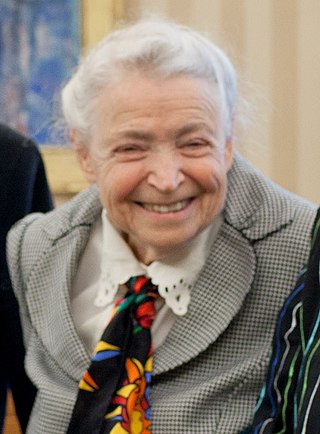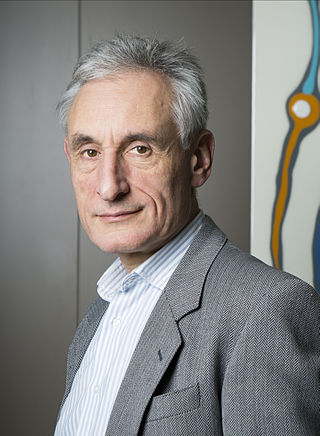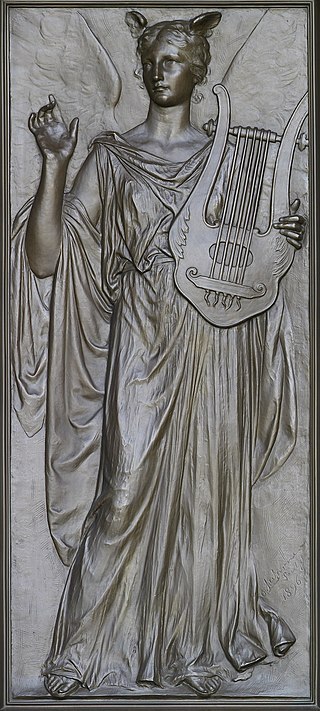Related Research Articles
Computational neuroscience is a branch of neuroscience which employs mathematical models, computer simulations, theoretical analysis and abstractions of the brain to understand the principles that govern the development, structure, physiology and cognitive abilities of the nervous system.
Computer art is any art in which computers play a role in production or display of the artwork. Such art can be an image, sound, animation, video, CD-ROM, DVD-ROM, video game, website, algorithm, performance or gallery installation. Many traditional disciplines are now integrating digital technologies and, as a result, the lines between traditional works of art and new media works created using computers has been blurred. For instance, an artist may combine traditional painting with algorithm art and other digital techniques. As a result, defining computer art by its end product can thus be difficult. Computer art is bound to change over time since changes in technology and software directly affect what is possible.

Mildred Dresselhaus, known as the "Queen of Carbon Science", was an American nanotechnologist. She was an Institute Professor and Professor Emerita of physics and electrical engineering at the Massachusetts Institute of Technology. Dresselhaus won numerous awards including the Presidential Medal of Freedom, the National Medal of Science, the Enrico Fermi Award and the Vannevar Bush Award.
Ron Burnett is an author, professor and the President Emeritus and Research Director for the new Centre for Transdisciplinary Studies at Emily Carr University of Art and Design.
The language module or language faculty is a hypothetical structure in the human brain which is thought to contain innate capacities for language, originally posited by Noam Chomsky. There is ongoing research into brain modularity in the fields of cognitive science and neuroscience, although the current idea is much weaker than what was proposed by Chomsky and Jerry Fodor in the 1980s. In today's terminology, 'modularity' refers to specialisation: language processing is specialised in the brain to the extent that it occurs partially in different areas than other types of information processing such as visual input. The current view is, then, that language is neither compartmentalised nor based on general principles of processing. It is modular to the extent that it constitutes a specific cognitive skill or area in cognition.

Electronic literature or digital literature is a genre of literature encompassing works created exclusively on and for digital devices, such as computers, tablets, and mobile phones. A work of electronic literature can be defined as "a construction whose literary aesthetics emerge from computation", "work that could only exist in the space for which it was developed/written/coded—the digital space". This means that these writings cannot be easily printed, or cannot be printed at all, because elements crucial to the text are unable to be carried over onto a printed version. As Di Rosario et al. 2021 note "Electronic literature is a digital-oriented literature, but the reader should not confuse it with digitized print literature."

Claudia Ann Koonz is an American historian of Nazi Germany. Koonz's critique of the role of women during the Nazi era, from a feminist perspective, has become a subject of much debate and research in itself. She is a recipient of the PEN New England Award, and a National Book Award finalist. Koonz has appeared on the podcasts Holocaust, hosted by University of California Television, and Real Dictators, hosted by Paul McGann. In the months before the 2020 United States presidential election, Koonz wrote about the risks of autocracy in the United States for History News Network and the New School's Public Seminar.
Elliott R. Sober is Hans Reichenbach Professor and William F. Vilas Research Professor in the Department of Philosophy at University of Wisconsin–Madison. Sober is noted for his work in philosophy of biology and general philosophy of science.

Nick Montfort is a poet and professor of digital media at MIT, where he directs a lab called The Trope Tank. He also holds a part-time position at the University of Bergen where he leads a node on computational narrative systems at the Center for Digital Narrative. Among his publications are seven books of computer-generated literature and six books from the MIT Press, several of which are collaborations. His work also includes digital projects, many of them in the form of short programs. He lives in New York City.

Andrew Blake FREng, FRS, is a British scientist, former laboratory director of Microsoft Research Cambridge and Microsoft Distinguished Scientist, former director of the Alan Turing Institute, Chair of the Samsung AI Centre in Cambridge, honorary professor at the University of Cambridge, Fellow of Clare Hall, Cambridge, and a leading researcher in computer vision.

Imagination is the production or simulation of novel objects, sensations, and ideas in the mind without any immediate input of the senses. Stefan Szczelkun characterises it as the forming of experiences in one's mind, which can be re-creations of past experiences, such as vivid memories with imagined changes, or completely invented and possibly fantastic scenes. Imagination helps make knowledge applicable in solving problems and is fundamental to integrating experience and the learning process. As an approach to build theory, it is called "disciplined imagination". A basic training for imagination is listening to storytelling (narrative), in which the exactness of the chosen words is the fundamental factor to "evoke worlds".
In the social sciences, framing comprises a set of concepts and theoretical perspectives on how individuals, groups, and societies organize, perceive, and communicate about reality.
Knowledge sharing is an activity through which knowledge is exchanged among people, friends, peers, families, communities, or within or between organizations. It bridges the individual and organizational knowledge, improving the absorptive and innovation capacity and thus leading to sustained competitive advantage of companies as well as individuals. Knowledge sharing is part of the Knowledge management process.
Tim Lewens is a professor in the history and philosophy of biology, medicine, and bioethics at the Department of History and Philosophy of Science at the University of Cambridge. Lewens is a Fellow of Clare College, where he serves as Director of Studies in Philosophy and he is a member of the academic staff and lecturer in the Department of History and Philosophy of Science (HPS).

Joseph Michael Reagle Jr. is an American academic and author focused on digital technology and culture, including Wikipedia, online comments, geek feminism, and life hacking. He is Associate Professor of Communication Studies at Northeastern University. He was an early member of the World Wide Web Consortium, based at the Massachusetts Institute of Technology, and in 1998 and 2010 he was a fellow at Harvard University's Berkman Klein Center for Internet & Society.

Embodied cognition is the theory that many features of cognition, whether human or otherwise, are shaped by aspects of an organism's entire body. Sensory and motor systems are seen as fundamentally integrated with cognitive processing. The cognitive features include high-level mental constructs and performance on various cognitive tasks. The bodily aspects involve the motor system, the perceptual system, the bodily interactions with the environment (situatedness), and the assumptions about the world built into the organism's functional structure.
David Hesmondhalgh is a British sociologist. He is currently Professor of Media, Music and Culture at the University of Leeds. His research focusses on the media and cultural industries, critical approaches to media in the digital age, and the sociology of music.
Virginia DeJohn Anderson is an American historian. She is professor of history at the University of Colorado Boulder and the author of three books: New England's Generation: The Great Migration and the Formation of Society and Culture in the Seventeenth Century, Creatures of Empire: How Domestic Animals Transformed Early America, and The Martyr and the Traitor: Nathan Hale, Moses Dunbar, and the American Revolution.
Julie Sze is Professor of American Studies at University of California, Davis. Her research deals with environmental justice, inequality and culture; race, gender and power; and community health and activism.
References
- ↑ Nayar, Pramod K. (2005). "How images think". Journal of the American Society for Information Science and Technology. 56 (10): 1126–1127. doi:10.1002/asi.20170.
- ↑ Cohen, Hart (2005). "Review: How Images Think". Media International Australia Incorporating Culture and Policy. 115 (1): 138–139. doi:10.1177/1329878X0511500115. ISSN 1329-878X. S2CID 188475731.
- ↑ Elkins, James (2007). "How Images Think (review)". University of Toronto Quarterly. 76 (1): 315–316. doi:10.1353/utq.2007.0072. ISSN 1712-5278. S2CID 161656200.
- ↑ VanderBurgh, Jennifer (2005). "Materializing PerceptionBurnett, Ron. 2004. How Images Think. Cambridge, MA: MIT Press.Cubitt, Sean. 2004. The Cinema Effect. Cambridge, MA: MIT Press". TOPIA: Canadian Journal of Cultural Studies. 13: 169–172. doi:10.3138/topia.13.169. ISSN 1206-0143.